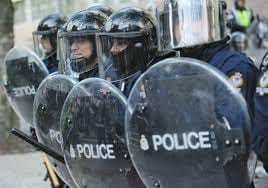In the age of social media, iPhones, and live streaming capabilities with the touch of a button, we’re able to get a firsthand look at how the police pursue suspects and conduct arrests, providing valuable insight and accountability. On the flipside, we also get an eyewitness account of the struggles police face from civilian interference. But when exactly does interference become obstruction, and under what circumstances is the charge pursued by Crown Counsel?

The Criminal Code defines obstruction as:
Offences relating to public or peace officer
129 Every one who
- (a) resists or wilfully obstructs a public officer or peace officer in the execution of his duty or any person lawfully acting in aid of such an officer,
- (b) omits, without reasonable excuse, to assist a public officer or peace officer in the execution of his duty in arresting a person or in preserving the peace, after having reasonable notice that he is required to do so, or
- (c) resists or wilfully obstructs any person in the lawful execution of a process against lands or goods or in making a lawful distress or seizure,
is guilty of
- (d) an indictable offence and is liable to imprisonment for a term not exceeding two years, or
- (e) an offence punishable on summary conviction.
As you can see, obstructing a peace officer does not exclusively apply to situations where a civilian interferes with the police conducting an arrest – it also applies in circumstances where a person fails to assist a police officer when provided reasonable notice to do so. For example, if the police attend your residence to arrest a family member, and you tell the police that that person isn’t home (when in fact they are) this would be considered obstruction, as it prevents the officer from making the arrest.
Further, being a nuisance at the scene of an arrest by directly involving yourself or failing to afford the police an adequate amount of space to safely conduct the arrest, can also be chargeable under section 129. And while you can film an arrest taking place, be mindful that your involvement is best restricted to observing only.
We see the offence of obstruction tacked on to a variety of charges: assault, sexual assault, fraud, theft over/under $5,000, and impaired driving (operation of a conveyance) to name a few.
If you have been charged with a criminal offence in British Columbia or the Yukon Territory, it is imperative that you retain experienced criminal defence counsel without delay. Before speaking to police, providing a statement, or sharing the circumstances of your situation with anyone else, call Tarnow Law to discuss your case.

